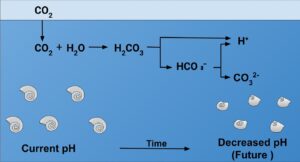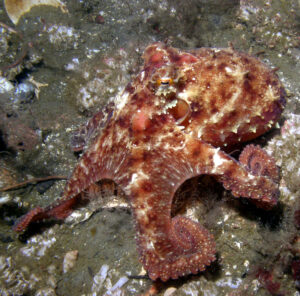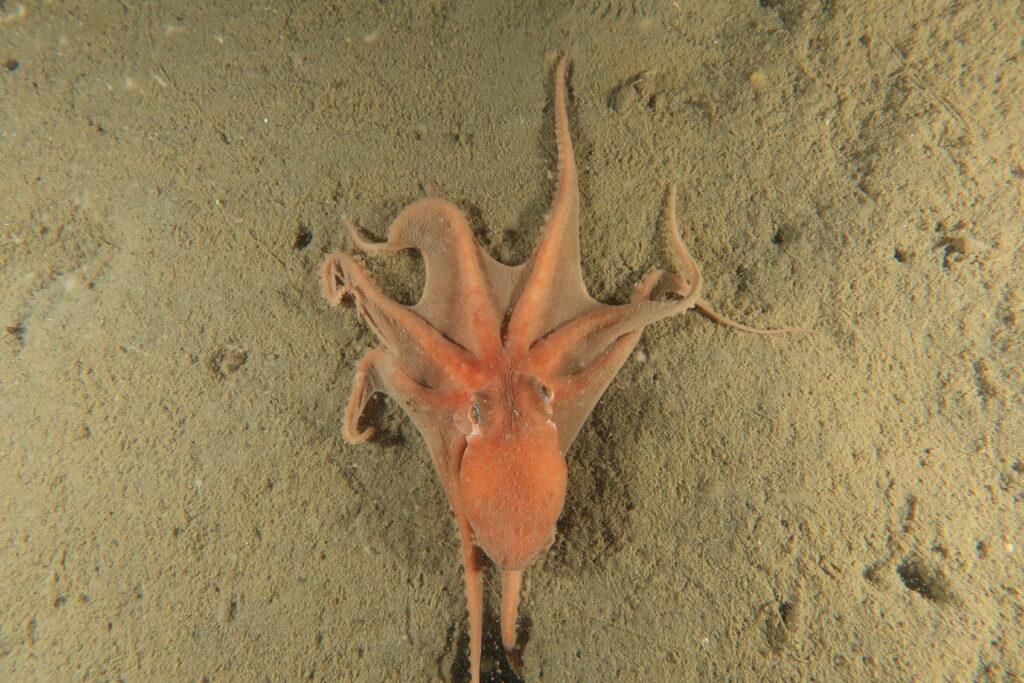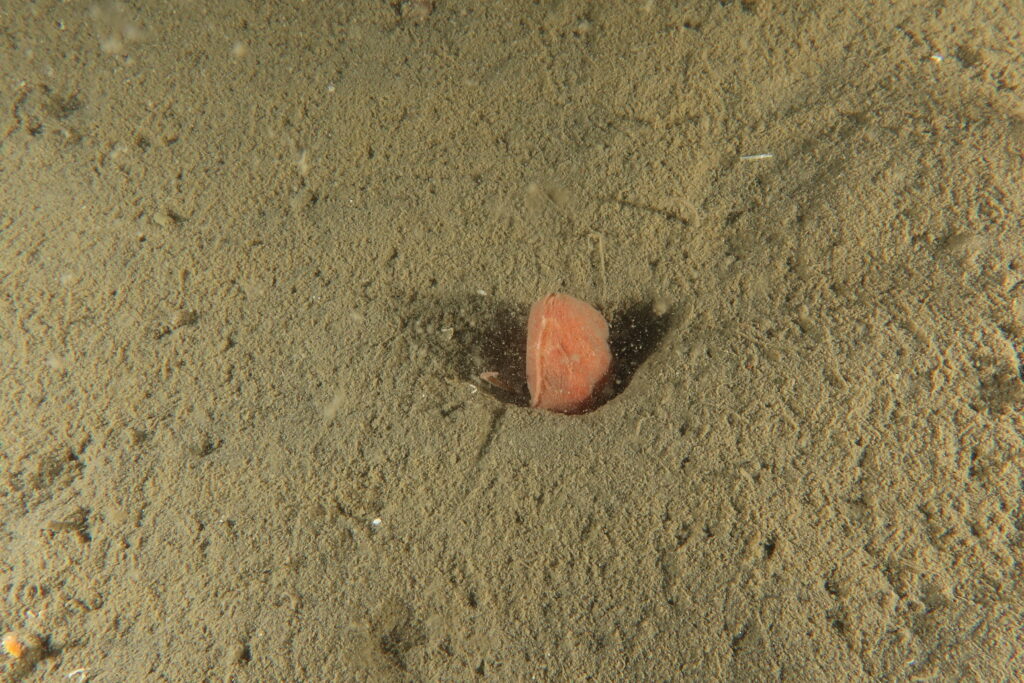Trueblood, L. A., Onthank, K., Bos, N., Buller, L., Coast, A., Covrig, M., … & Springbett, C. (2022). Bathyal octopus, Muusoctopus leioderma, living in a world of acid: First recordings of routine metabolic rate and critical oxygen partial pressures of a deep water species under elevated pCO2. Frontiers in Physiology, 13, 2531. https://doi.org/10.3389/fphys.2022.1039401
By now it’s been well established that burning fossil fuels releases a variety of fossil fuels into the atmosphere, including carbon dioxide, or CO2, and this can have far-reaching effects on biological life. On top of this, at least one third of all that human-made CO2 ends up in the oceans. This is causing a lot of changes in marine environments, but perhaps the most alarming effect is a process known as ocean acidification. Ocean acidification is when greenhouse gasses absorbed by the ocean lower the pH, or in other words, increase the acidity of the water.

One group of particular interest to the public right now is cephalopods. This is a diverse group of squishy invertebrates that includes squids, cuttlefish, and octopuses. Octopuses in particular are of special interest due to their highly developed nervous system, intelligence, unique behavior, and amazing life strategies. Octopuses can camouflage, solve puzzles, mimic rocks, and other animals, and are all-around awesome organisms. They are also abundant and expanding in both numbers and range. You can find octopuses in every ocean, whether it be at the frigid polar ice caps or the balmy tropics. This, coupled with the fact that octopuses are generalist predators that will eat most things that end up on their plate, mean that octopuses are believed to be resilient to humans and climate change.
The big question is how will octopuses handle ocean acidification? A few studies have looked at how ocean acidification impacts cephalopods, with the main focus being impacts on the animals’ physiology. A good way of examining physiological impacts is by measuring metabolic rate, or the measurement of an animal’s energy use. Researchers measure how quickly organisms are breathing and consuming oxygen, which gives an idea of how efficiently they’re using energy. Ocean acidification has been shown to have negative impacts on the respiratory physiology of crab, fish, and even some cephalopods. However, ocean acidification’s influence on octopuses is still unclear. For example, experiments with Octopus rubescens, a common octopus in the western US, showed a brief increase in its routine metabolic rate, basically its normal breathing rate when its up and active, when exposed to acidified water for a short time, but eventually the octopuses acclimated to the water and its metabolism returned to normal. Some cuttlefish and squid on the other hand, have seen more adverse effects. We just don’t know exactly how octopuses will respond.

Photo: Kirt L Onthank, Wiki Commons
Researchers set out to see how acidification impacts another octopus species. Muusoctopus leioderma, the Smoothskin octopus, is an adorable deep-water octopus normally found between 450-650 meters in silty marine sediment beds. However, researchers found a population of this species in only 15 meters of water, meaning it was accessible to collect and study with SCUBA. This species is also a burrowing octopus, meaning it creates its dens by digging deep holes in the sediment beds, like a little deep-sea gopher. No other member of the Muusoctopus clade is so accessible or easily studied, so this was a perfect candidate to study the impact of acidification.

The researchers set up an experiment where they exposed those octopuses to different levels of acidified water, and for different periods of time. To measure the octopuses’ metabolism, the researchers used a method known as flow through respirometry. Basically, the octopus was kept in a small chamber with water lines connected to a pump and lots of sensors for measuring oxygen and carbon dioxide. The researchers knew the starting levels of oxygen and carbon dioxide before beginning the measurement. As the octopus consumed oxygen and breathed out CO2, researchers could measure the changes as water cycled from the pump and sensors, to the octopus, then back. This allowed them to measure the octopus’ routine metabolic rate. Another measurement of metabolic rate is called Pcrit, or the level of oxygen in the ocean where an animal can no longer breathe and sustain itself. Animals with lower Pcrit can survive in a more hypoxic (low oxygen) environment, and the researchers wanted to know if the octopuses’ Pcrit would change in acidified waters.
Smoothskin octopus in the lab, Photo: Cheyne Springbett
The results of the experiment showed that octopuses might be resilient to ocean acidification. Smoothskin octopuses maintained their normal routine metabolic rate and Pcrit levels in acidified treatments even for long periods of time. There are many things that might explain this. One possibility is that because this is a burrowing octopus, and burrows, narrow, long tunnels at the bottom of the ocean, are hypoxic environments, this octopus might be well adapted to deal with limited oxygen. The results of this study might also explain how a deep water octopus is surviving at such shallow depths, in the acidified and low oxygen environment of the Salish Sea.

As the ocean acidifies more and more each year, we may become swarmed with resilient organisms like octopuses. While more research is definitely required to see how the group will be impacted, this study shows that octopuses may be well equipped to thrive in the face of climate change. Hopefully, we will see many more of our squishy friends in the near future.
I’m pursuing a Master’s in Biology at Walla Walla University. My research is focused on the best marine animal ever, octopuses. I am particularly interested in octopus behavior and their interactions with their environment. My thesis is exploring burrowing behavior of a particular octopus species, Muusoctopus leioderma, in Anacortes, WA. Before this, I worked as a fisheries observer in Alaska, collecting data on the commercial fishing effort in the Bering Sea and generally spending way too much time on boats. I like all things ocean, including diving, surfing, and writing about cool topics in marine science!

